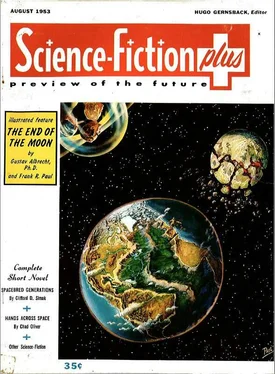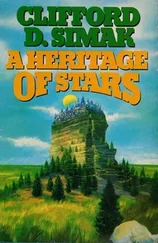Horror and wonder—a going back. A going back through a thousand years to a knowledge that could build machines like these. A going back much farther to an instability of human emotions that would drive one man to kill another man.
I must be rid of him, Jon Hoff thought bitterly. I must be rid of him. But I never will be. When he has disappeared, when he has become something other than what he is, when the substances of him have become something else, I still shall not be rid of him. Never!
He found the converter door and braced himself in front of it. He tugged at the door. It stuck and he jerked at it and it came free. The maw gaped, large enough to take a human body, and from behind the baffles he could hear the roaring of the power and imagined that he caught the hellish flicker of the ravening fire.
He balanced the body on his shoulder and slid it off as gently as he could, feeding it to the maw. He gave it a final push and closed the door and trod hard upon the feeder mechanism.
The deed finally was done.
He reeled back from the converter's face and mopped his brow and now the burden was gone, but it still was with him.
As it always would be, he thought. As it always would be.
The footsteps came at him and he did not swing around to face them, for he knew whose the footsteps were—the ghostly footsteps that would dog him all his life—the footsteps of guilt walking in his mind.
A voice said: "Lad, what have you done!"
Jon said: "I have killed a man. I have killed my friend."
And he swung around to face the footsteps and the voice, because neither one was ghost.
Joshua said: "There was a reason for it, lad?"
"A reason," said Jon Hoff. "A reason and a purpose."
"You need a friend," Joshua told. "You need a friend, my boy."
Jon nodded. "I found the purpose of the Ship. And the destination. He found me out. He was going to denounce me. I—I—."
"You killed him."
"I thought: One life or all? I only took one life. He would have taken all."
They stood for a long moment, facing one another. The old man said: "It is not right to take a life. It is not right nor proper."
He stood there, stumpy and stolid, against the background of the engines, but there was something vital in him, some driving force within him as there was in the engines.
"Nor is it right," he said, "to condemn the Folk to a fate that was not intended. It is not right to let a purpose go by default and ignorance."
He asked: "The purpose of the Ship? It is a good purpose?"
"I do not know," said Jon. "I can't be sure. But at least it is a purpose. A purpose, any purpose, is better than none at all."
He raised his head and brushed back his hair, plastered down with sweat across his brow.
"All right," he said. "I'll go along with you. I've taken one life. I'll not take any more."
Joshua spoke slowly, gently. "No lad. I am the one who goes along with you."
TO SEEthe great depth of the emptiness in which the stars blazed like tiny, eternal watch-fires, was bad enough when one looked out a blister port. To see it from the control room, where the great glass plate opened out into the very jaws of space, was something else again.
You could look down and down and there was no bottom and you could look up or out and there was no stopping, and one moment you would swear that a certain star could be reached out for and plucked and the next moment it was so far away that your brain spun with the very thought of distance.
The stars were far.
All but one of them.
And that one blazed, a flaming sun, off toward the left.
Jon Hoff flicked a glance at Joshua and the old man's face was frozen in a mask that was disbelief and fear and something touching horror.
And, he thought, I knew. I knew what it might be like. I had some idea. But he had none at all.
He pulled his eyes from the vision plate and saw the banks of instruments and his stomach seemed to turn over and his fingers were all thumbs.
No time to live with the ship, he told himself. No time to get to know it as it really is. What must be done he must do by intellect alone, by the sketchy knowledge impressed upon his brain—a brain that was not trained or ready, that it might take many years to make trained and ready.
"What are we to do?" Joshua whispered. "Lad, what are we to do?"
And Jon Hoff thought: What are we to do?
He walked slowly forward and mounted the steps to the chair that said NAVIGATORon the back of it. Slowly he hoisted himself into the chair and it seemed that he sat on the edge of space itself, that he sat upon a precipice from which at any moment he might slip off and tumble into space.
He put his hands down carefully and gripped the chair's arms and hung on tight and fought to orient himself, to know that he sat in a navigator's chair and that in front of him were trips and buttons that he could press or trip and that the pressing and the tripping of them would send signals to the pulsing engine room.
"That star," said Joshua. "That big one off to the left. The burning one . . ."
"All the stars are burning."
"But that one. The big one . . ."
"That's the one we headed for a thousand years ago," said Jon.
And he hoped it was. He wished he could be certain that it was the one.
Even as he thought it, bells of alarm were ringing in his brain.
There was something wrong.
Something very wrong.
He tried to think, but space was too close to think, space was too big and empty and there was no use of thinking. One could not outwit space. One could not fight space. It was too big and cruel. Space did not care. It had no mercy in it. It did not care what happened to the ship or the people in it.
The only ones who had ever cared had been the people back on Earth who had launched the ship, and, for a little while, the Folk who rode the ship. And finally, he and one old man. They two against all space.
The only ones who cared.
"It's bigger than the others," said Joshua. "We are closer to it."
That was what was wrong!
That was what had rung the alarm within his mind. The star was far too close!
It shouldn't be that close!
He wrenched his eyes from space and looked down at the control board and all he saw was a meaningless mass of trips and levers, banks of buttons, rows of dials.
He watched the board and slowly his mind began to sort it out, to make some sense of it, the knowledge the machine had pounded into him beginning to take over.
He read the dials and he got some knowledge from them. He located certain controls that he had to know about.
Mathematics rose unbidden in his brain and did a nightmare dance.
It was useless, he told himself. It had been a good idea, but it hadn't worked. You couldn't educate a man by a machine.
You couldn't pound into him the knowledge necessary to navigate a ship.
"I can't do it, Joshua," he cried. "It's impossible to do it."
Where were the planets? he wondered. How could he find the planets? And when he found them, if he found them, what would he do then?
The ship was falling toward the sun.
He didn't know where to look for planets.
And they were going too fast—they were going far too fast.
Sweat burst out upon him, beading brow and running down his face, dripping from his armpits. "Take it easy, lad. Take it easy now."
He tried to take it easy, but it didn't work.
He reached down and slid open the tiny drawer beneath the control panel. There was paper there and pencils. He took out a sheet of paper and a pencil. He jotted down the readings on the dials.
Absolute velocity.
Increase of velocity.
Distance from the star. Angular approach to the star.
Читать дальше










